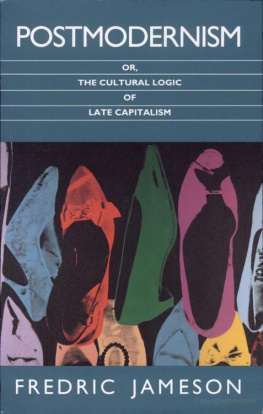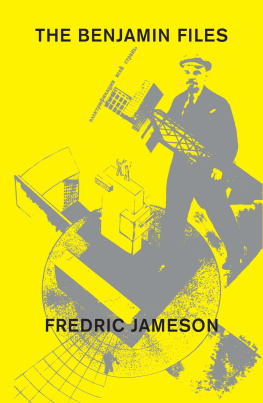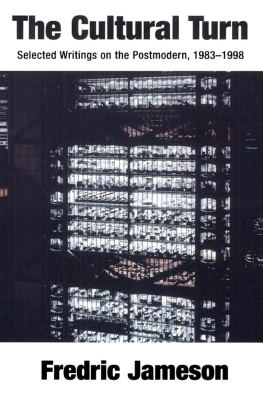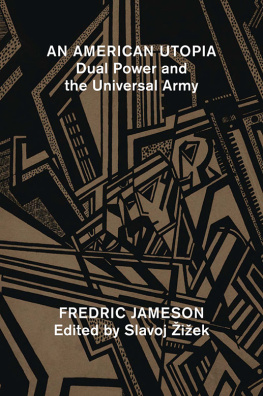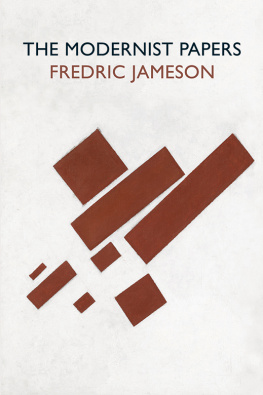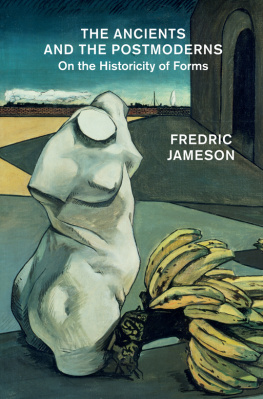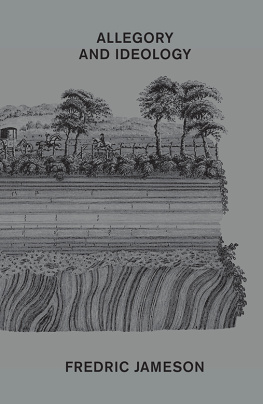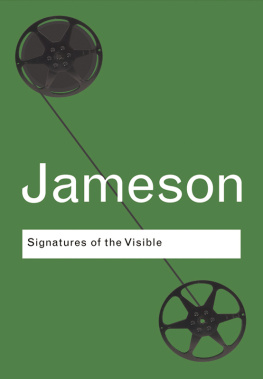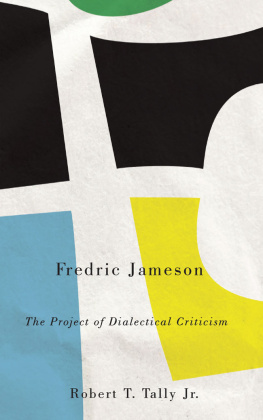Fredric Jameson - Postmodernism, or, The cultural logic of late capitalism
Here you can read online Fredric Jameson - Postmodernism, or, The cultural logic of late capitalism full text of the book (entire story) in english for free. Download pdf and epub, get meaning, cover and reviews about this ebook. year: 1991, publisher: Duke University Press, genre: Romance novel. Description of the work, (preface) as well as reviews are available. Best literature library LitArk.com created for fans of good reading and offers a wide selection of genres:
Romance novel
Science fiction
Adventure
Detective
Science
History
Home and family
Prose
Art
Politics
Computer
Non-fiction
Religion
Business
Children
Humor
Choose a favorite category and find really read worthwhile books. Enjoy immersion in the world of imagination, feel the emotions of the characters or learn something new for yourself, make an fascinating discovery.
- Book:Postmodernism, or, The cultural logic of late capitalism
- Author:
- Publisher:Duke University Press
- Genre:
- Year:1991
- Rating:4 / 5
- Favourites:Add to favourites
- Your mark:
- 80
- 1
- 2
- 3
- 4
- 5
Postmodernism, or, The cultural logic of late capitalism: summary, description and annotation
We offer to read an annotation, description, summary or preface (depends on what the author of the book "Postmodernism, or, The cultural logic of late capitalism" wrote himself). If you haven't found the necessary information about the book — write in the comments, we will try to find it.
Postmodernism, or, The cultural logic of late capitalism — read online for free the complete book (whole text) full work
Below is the text of the book, divided by pages. System saving the place of the last page read, allows you to conveniently read the book "Postmodernism, or, The cultural logic of late capitalism" online for free, without having to search again every time where you left off. Put a bookmark, and you can go to the page where you finished reading at any time.
Font size:
Interval:
Bookmark:
FREDRIC JAMESON
POSTMODERNISM , or, The Cultural Logic of Late Capitalism
DUKE UNIVERSITY PRESS DURHAM
Seventh printing in paperback, 1997 1991 Duke University Press All rights reserved Printed in the United States ofAmerica on acid-free paper ; Library of CongressCataloging-in-Publication Data appear on the last printed page of this book.Anumber of chapters, or parts of chapters, of this book have appeared inprevious publications, sometimes in an earlier form.
Chapter 1. 1984 "Postmodernism, Or, The CulturalLogic of Late Capitalism." New Left Review, no. 146 (July-August): - .
Chapter 2. 1984 "The Politics of Theory: IdeologicalPositions in the Debate." New German Critique, no. 53 (Fall): - .
Chapter 4. 1990 "Spatial Equivalents: Postmodernist Architectureand the World System," The States of Theory, ed. David Carroll (ColumbiaUniversity Press): - 48.
Chapter 6. 1988 "Postmodernism and Utopia." Instituteof Contemporary Art publication (Boston) (March): - .
Chapter 8. 1990 "Postmodernism and the Market,"in The Retreat of the Intellectuals: Socialist Register 1990, ed. RalphMiliband and Leo Panitch (London: Merlin): - . Chapter 9.1989 "Nostalgia for the Present." SAQ 38 no. 2, (Spring):517-37.
For Mitchell Lawrence
Contents
Introduction
CULTURE
1 The CulturalLogic of Late Capitalism
IDEOLOGY
2 Theories of thePostmodern
VIDEO
3 SurrealismWithout the Unconscious
ARCHITECTURE
4 SpatialEquivalents in the World System
SENTENCES
5 Reading and theDivision of Labor
SPACE
6 UtopianismAfter the End of Utopia
THEORY
7 Immanence andNominalism in Postmodern Theoretical Discourse
ECONOMICS
8 Postmodernism and the Market
FILM
9 Nostalgia for the Present
CONCLUSION
10 Secondary Elaborations
Introduction
It is safest to grasp the concept of the postmodern as anattempt to think the present historically in an age that has forgotten how tothink historically in the first place. In that case, it either"expresses" some deeper irrepressible historical impulse (in howeverdistorted a fashion) or effectively "represses" and diverts it,depending on the side of the ambiguity you happen to favor. Postmodernism,postmodern consciousness, may then amount to not much more than theorizing itsown condition of possibility, which consists primarily in the sheer enumerationof changes and modifications. Modernism also thought compulsively about the Newand tried to watch its coming into being (inventing for that purpose theregistering and inscription devices akin to historical time-lapse photography),but the postmodern looks for breaks, for events rather than new worlds, for thetelltale instant after which it is no longer the same; for the"When-it-all-changed," as Gibson puts it, or, better still, forshifts and irrevocable changes in the representation of things and of the waythey change. The moderns were interested in what was likely to come of suchchanges and their general tendency: they thought about the thing itself,substantively, in Utopian or essential fashion. Postmodernism is more formal inthat sense, and more "distracted," as Benjamin might put it; it onlyclocks the variations themselves, and knows only too well that the contents arejust more images. In modernism, as I will try to show later on, some residualzones of "nature" or "being" of the old, the older, thearchaic, still subsist; culture can still do something to that nature and workat transforming that "referent." Postmodernism is what you have whenthe modernization process is complete and nature is gone for good. It is a morefully human world than the older one, but one in which "culture" hasbecome a veritable "second nature." Indeed, what happened to culture may wellbe one of the more important clues for tracking the postmodern: an immensedilation of its sphere (the sphere of commodities), an immense and historicallyoriginal acculturation of the Real, a quantum leap in what Benjamin stillcalled the "aestheticization" of reality (he thought it meantfascism, but we know it's only fun: a prodigious exhilaration with the neworder of things, a commodity rush, our "representations" of thingstending to arouse an enthusiasm and a mood swing not necessarily inspired bythe things themselves). So, in postmodern culture, "culture" hasbecome a product in its own right; the market has become a substitute foritself and fully as much a commodity as any of the items it includes withinitself: modernism was still minimally and tendentially the critique of thecommodity and the effort to make it transcend itself. Postmodernism is theconsumption of sheer commodification as a process. The "life-style"of the superstate therefore stands in relationship to Marx's "fetishism"of commodities as the most advanced monotheisms to primitive animisms or themost rudimentary idol worship; indeed, any sophisticated theory of thepostmodern ought to bear something of the same relationship to Horkheimer andAdorno old "Culture Industry" concept as MTV or fractal ads bear tofifties television series.
"Theory" has meanwhile itself also changed andoffers its own kind of clue to the mystery. Indeed, one of the more strikingfeatures of the postmodern is the way in which, in it, a whole range oftendential analyses of hitherto very different kinds -- economic forecasts,marketing studies, culture critiques, new therapies, the (generally official)jeremiad about drugs or permissiveness, reviews of art shows or national filmfestivals, religious "revivals" or cults -have all coalesced into anew discursive genre, which we might as well call "Postmodernismtheory," and which demands some attention in its own right. It is clearlya class which is a member of its own class, and I would not want to have todecide whether the following chapters are inquiries into the nature of such"Postmodernism theory" or mere examples of it.
I have tried to prevent my own account of Postmodernism-- which stages a series of semiautonomous and relatively independent traits orfeatures -- from confiating back into the one uniquely privileged symptom of aloss of historicity, something that by itself could scarcely connote thepresence of the Postmodernism in any unerring fashion, as witness peasants,aesthetes, children, liberal economists, or analytic philosophers. But it ishard to discuss "Postmodernism theory" in any general way withouthaving recourse to the matter of historical deafness, an exasperating condition(provided you are aware of it) that determines a series of spasmodic andintermittent, but desperate, attempts at recuperation. Postmodernism theory isone of those attempts: the effort to take the temperature of the age withoutinstruments and in a situation in which we are not even sure there is socoherent a thing as an "age," or Zeitgeist or "system" or"current situation" any longer. Postmodernism theory is thendialectical at least insofar as it has the wit to seize on that veryuncertainty as its first clue and to hold to its Ariadne's thread on its waythrough what may not turn out to be a labyrinth at all, but a gulag or perhapsa shopping mall. An enormous Claes Oldenburg thermometer, however, as long as awhole city block, might serve as some mysterious symptom of the process, fallenwithout warning from the sky like a meteorite.
For I take it as axiomatic that "modernisthistory" is the first casualty and mysterious absence of the Postmodernismperiod (this is essentially Achille Bonito-Oliva's version of Postmodernismtheory): Mn art, at least, the notion of progress and telos remained alive andwell up to very recent times indeed, in its most authentic, least stupid andcaricatural, form, in which each genuinely new work unexpectedly but logicallyouttrumped its predecessor (not "linear history" this, but ratherShklovsky's "knight's gambit;" the action at distance, the quantumleap to the undeveloped or underdeveloped square). Dialectical history, to besure, affirmed that all history worked this way, on its left foot, as it were,progressing, as Henri Lefebvre once put it, by way of catastrophe and disaster;but fewer ears heard that than believed the modernist aesthetic paradigm, whichwas on the point of being confirmed as a virtual religious doxa when itunexpectedly vanished without a trace. ("We went out one morning and theThermometer was gone!")
Next pageFont size:
Interval:
Bookmark:
Similar books «Postmodernism, or, The cultural logic of late capitalism»
Look at similar books to Postmodernism, or, The cultural logic of late capitalism. We have selected literature similar in name and meaning in the hope of providing readers with more options to find new, interesting, not yet read works.
Discussion, reviews of the book Postmodernism, or, The cultural logic of late capitalism and just readers' own opinions. Leave your comments, write what you think about the work, its meaning or the main characters. Specify what exactly you liked and what you didn't like, and why you think so.

